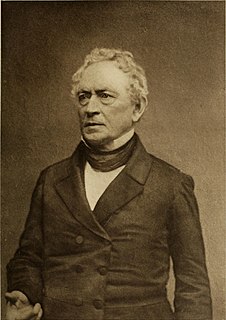A Quote by Rene Dubos
Man not only survives and functions in his environment, he shapes it and he is shaped by it.
Related Quotes
But nature - that is, biological evolution - has not fitted man to any specific environment. On the contrary, ... he has a rather crude survival kit; and yet -this is the paradox of the human condition - one that fits him to all environments. Among the multitude of animals which scamper, fly, burrow and swim around us, man is the only one who is not locked into his environment. His imagination, his reason, his emotional subtlety and toughness, make it possible for him not to accept the environment but to change it.
A great character, founded on the living rock of principle is, in fact, not a solitary phenomenon, to be at once perceived, limited, and described. It is a dispensation of Providence, designed to have not merely an immediate, but a continuous, progressive, and never-ending agency. It survives the man who possessed it; survives his age,--and perhaps, his country, his language.
The trouble with the theory [of limited and divided government] is that government is not a machine, but a living thing. This is where the living and breathing constitution comes from. It is modified by its environment, necessitated by its tasks, shaped to its functions by the sheer pressure of life.
[He] looked up and imagined the hand of God flinging stars like shining dust across the heavens. No. He was wrong to think such pagan thoughts, for God had only to utter a word and it was done. Only man had He shaped with His hands, using the dust He created to form His most precious and amazing creation. Only man was molded and loved into being, the breath of life in his lungs given by God.
'Environment' is not an abstract concern, or simply a matter of aesthetics, or of personal taste - although it can and should involve these as well. Man is shaped to a great extent by his surroundings. Our physical nature, our mental health, our culture and institutions, our opportunities for challenge and fulfillment, our very survival - all of these are directly related to and affected by the environment in which we live. They depend upon the continued healthy functioning of the natural systems of the Earth.
The consideration of man's body has not changed to meet the new conditions of this artificial environment that has replaced his natural one. The result is that of perceptual discord between man and his environment. The effect of this discord is a general deterioration of man's body, the symptoms of which are termed disease.
History is the long struggle of man, by exercise of his reason, to understand his environment and to act upon it. But the modern period has broadened the struggle in a revolutionary way. Man now seeks to understand, and act on, not only his environment, but himself; and this has added, so to speak, a new dimension to reason and a new dimension to history.



































